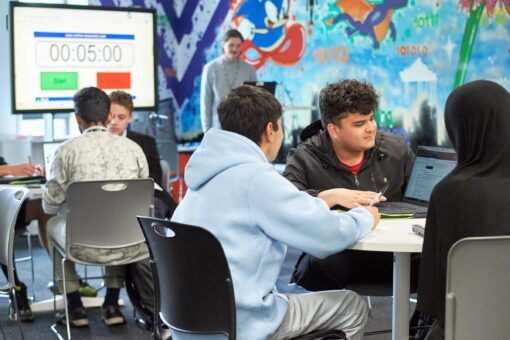
Introduction
This programme has been developed in partnership with top employers such as ARM, BBC, BT, Cisco, and CompTIA, ensuring you gain the precise knowledge and skills that are highly sought after in the industry. Our course is led by a team of highly experienced Computer Science teachers who are passionate about guiding you toward a successful professional career. They bring a wealth of real-world experience into the classroom, offering you insights that go beyond textbooks.
As part of your T Level, you will undertake a minimum of 45 days of industry placement, providing you with the opportunity to work closely with computing industry experts. You’ll apply your software design and development skills in a professional environment and learn directly from industry leaders. In addition you will complete a number of industry-based professional certification programmes from the likes of Cisco Networking Academy.
This T Level offers a rigorous combination of specialised academic learning in computing, delivered by expert teachers, and extensive hands-on experience in the workplace. By the end of your two-year program, you’ll be well-equipped to transition seamlessly into a Digital Apprenticeship Degree or a University Computer Science Degree, setting the stage for a thriving career in the digital sector.
What you’ll learn
In the Core Components in your first year you learn about digital industry and will study the following topics:
- Problem Solving
- Programming (full-stack development)
- Emerging issues and impact of digital
- Legislation and regulatory requirements
- Business context (including UX/UI)
- Data (including Database Development)
- Digital environments (including Networking)
- Cyber Security
In the Occupational Specialist Component in your second year you will develop your wider digital skills and continue to build your professional programming and design skills to:
- Analyse a problem to define requirements and acceptance criteria aligned to user requirements
- Apply ethical principles and manage risks in line with legal and regulatory requirements when developing software.
- Discover, evaluate and apply reliable sources of knowledge.
- Design, implement and test software.
- Create solutions in social and collaborative environments.
- Use at least two programming languages to develop, test, and support your software solutions to problems.
Computer Science and Ada’s values
Our learners exhibit a natural curiosity and keen interest in technology. They demonstrate a strong commitment to thorough research, delving deeper into the subject matter than what is covered in course textbooks. They embrace collaboration when working on solutions to challenging problems, harness their creativity to explore diverse information sources, display resilience when applying their knowledge to assessments and externally evaluated exams, and showcase emerging practical skills when designing and developing those problem solutions. The realisation of these values is therefore a critical component in preparing you for your next steps in your journey towards a successful and fulfilling career in the digital skills sector.
Progression and career opportunities
The qualification is intended to help you progress into highly skilled employment in the Digital Sector, with a focus on interactive and digital software design and development.
Examples of progression and initial career opportunities include:
- Software Developer
- Digital Games Developer
- Web Developer
- Mobile Application Developer
- Application Support Analyst
- Cyber Security Analyst
Course specifics
Pearson T Level Technical Qualification in Digital Software Development (1200 GLH) 610/5801/4
Managers and teachers work frequently with employers to ensure that students develop the knowledge and skills required by the digital sector. All students work on industry projects.